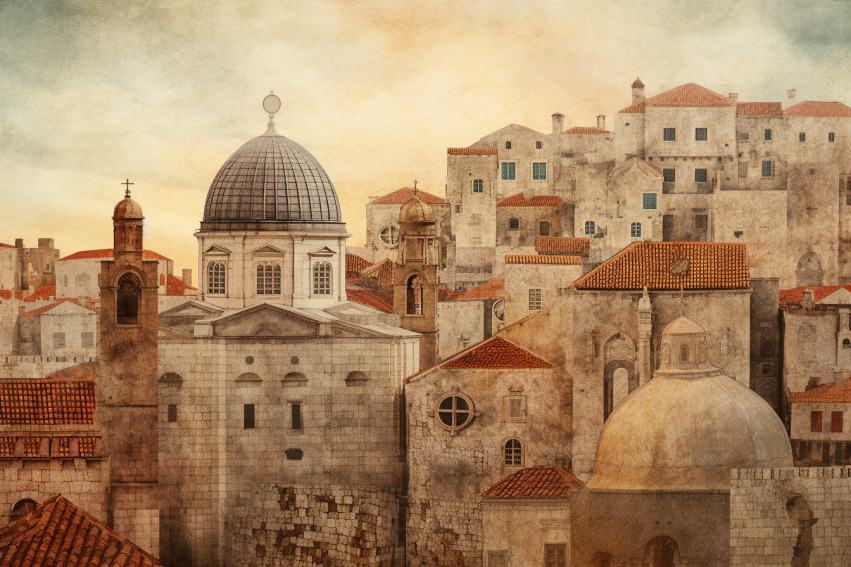You can find a PDF of this lesson plan here.
Lesson Overview
Featured article: Centers of Progress, Pt. 37: Dubrovnik (Public Health) by Chelsea Follett
Dubrovnik is a beautiful walled city on the Dalmatian coast of Croatia. It’s a UNESCO World Heritage site and one of the most popular tourist destinations in the Mediterranean. But did you know that it was also once home to one of the freest and most cosmopolitan societies in Europe and one of the first societies to implement comprehensive public health measures to contain disease?
Chelsea Follet writes, “Not only was the small city-state of the Republic of Ragusa at the forefront of freedom for its time, being one of the earliest countries to ban slavery, but the glittering merchant city on the sea was also the site of an early milestone in the history of public health: quarantine waiting periods, which were first implemented in 1377.”
Warm-up
Where is Dubrovnik? What is it like there? Watch this 5-minute video from Rick Steves to build background about this picturesque city.
When you’re done watching, with partners, in small groups, or as a whole class, respond to the following questions:
- In the 15th century, what were the mainstays of Dubrovnik’s economy?
- Steves mentions that the city walls were fortified about 500 years ago. Which world power threatened Dubrovnik during that time?
- Dubrovnik remained independent until the 1800s. Make an educated guess: Which European power took control over the city at that time?
- Which conflict affected Dubrovnik during the 1990s, resulting in significant damage to many buildings?
Questions for reading, writing, and discussion
Read the article, then answer the following questions:
- The Describe the political structure of the Republic of Ragusa during its period of independence from 1358 to 1808. Why was this type of governance unique for that period?
- What sociopolitical practice does Follett cite as important to maintaining the pool of eligible aristocrats charged with governing the city-state?
- The constitution of the Republic of Ragusa stipulated that the top government official had a term limit of just one month. What do you think were the likely social and political effects of that limit?
- The article discusses several manifestations of Dubrovnik’s economic ethos of capitalism and free trade. Describe three specific examples of these economic ideas from the article.
- The article also cites several ways that Dubrovnik promoted freedom and human rights. Explain three specific examples of these humanistic ideals mentioned in the article.
- What were some of the ways that Dubrovnik promoted public health prior to and during the Black Death? Name at least three.
- Dubrovnik is famous as the originator of a systematic quarantine policy for those possibly carrying infectious diseases. What is the etymology of the word “quarantine”? How is the meaning of that word specifically related to victims of the bubonic plague?
Extension Activity/Homework
Make a case study of your community.
Follett holds up Dubrovnik as a model. She uses detailed information to argue that peace, prosperity, and tolerance come about when there is respect for individual rights, the promotion of economic freedom, and limited government.
Create a Google Presentation or PowerPoint about your own community. Make a case for the dominant ethos of your hometown and explain why it has helped to grow your community. For this case study, conduct research and present information about:
- History: founding, important figures, growth over the years
- Population: age range, racial and ethnic groups, languages spoken, religions
- Economy: main sectors, number and types of jobs, big employers
- Institutions: government structure, schools and colleges, civil society (churches, clubs, nonprofits, etc.)
- Outlook: What does the future hold for your community?
Create at least 10 slides. Be creative. Find or take photos to supplement your writing. Think deeply about why your hometown has been successful. Does it have a strong tradition of public education? A tight-knit faith community? A strategic location near key economic resources? Make an argument about why it’s been a success.
Write about quarantine and isolation.
Over the centuries, the government of Dubrovnik instituted quarantine policies for all those entering the city from infected areas. Due to the COVID-19 pandemic, billions of people around the world also went through a prolonged period during which they were isolated from friends and family. You were likely unable to see your loved ones for many months.
How did this period of isolation affect you? How did you change and/or grow as a person? What did you like about that time? What did you dislike?
In a short reflective piece—either a paragraph, poem, song, drawing, or another creative medium of your choice—describe your personal reaction to this period of prolonged isolation.

